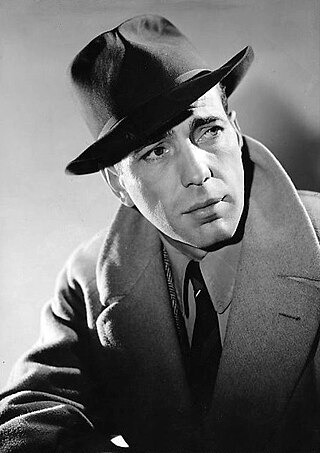
Humphrey DeForest Bogart, nicknamed Bogie, was an American actor. His performances in classic Hollywood cinema made him an American cultural icon. In 1999, the American Film Institute selected Bogart as the greatest male star of classic American cinema.

Romantic comedy is a sub-genre of comedy and romance fiction, focusing on lighthearted, humorous plot lines centered on romantic ideas, such as how true love is able to surmount all obstacles.
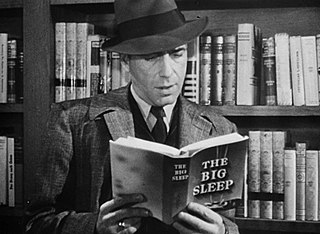
Philip Marlowe is a fictional character created by Raymond Chandler who was characteristic of the hardboiled crime fiction genre. The genre originated in the 1920s, notably in Black Mask magazine, in which Dashiell Hammett's The Continental Op and Sam Spade first appeared. Marlowe first appeared under that name in The Big Sleep, published in 1939. Chandler's early short stories, published in pulp magazines such as Black Mask and Dime Detective, featured similar characters with names like "Carmady" and "John Dalmas", starting in 1933.

Thriller is a genre of fiction with numerous, often overlapping, subgenres, including crime, horror, and detective fiction. Thrillers are characterized and defined by the moods they elicit, giving their audiences heightened feelings of suspense, excitement, surprise, anticipation and anxiety. This genre is well suited to film and television.

Betty Joan Perske, professionally known as Lauren Bacall, was an American actress. She was named the 20th-greatest female star of classic Hollywood cinema by the American Film Institute. She received an Academy Honorary Award in 2009 in recognition of her contribution to the Golden Age of motion pictures. Bacall was one of the last surviving major stars from the Golden Age of Hollywood cinema.
A hybrid genre is a literary or film genre that blends themes and elements from two or more different genres. Hybrid genre works are also referred to as cross-genre, multi-genre, mixed genre, or fusion genre. Some hybrid genres have acquired their own specialised names, such as comedy drama ("dramedy"), romantic comedy ("rom-com"), horror Western, and docudrama.
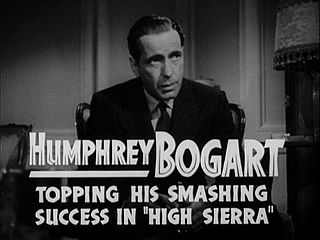
Sam Spade is a fictional character and the protagonist of Dashiell Hammett's 1930 novel The Maltese Falcon. Spade also appeared in four lesser-known short stories by Hammett.

Romance films involve romantic love stories recorded in visual media for broadcast in theatres or on television that focus on passion, emotion, and the affectionate romantic involvement of the main characters. Typically their journey through dating, courtship or marriage is featured. These films make the search for romantic love the main plot focus. Occasionally, romance lovers face obstacles such as finances, physical illness, various forms of discrimination, psychological restraints or family resistance. As in all quite strong, deep and close romantic relationships, the tensions of day-to-day life, temptations, and differences in compatibility enter into the plots of romantic films.

In a Lonely Place is a 1950 American film noir directed by Nicholas Ray and starring Humphrey Bogart and Gloria Grahame, produced for Bogart's Santana Productions. The script was written by Andrew P. Solt from Edmund H. North's adaptation of Dorothy B. Hughes' 1947 novel of the same name.

The Big Sleep is a 1946 American film noir directed by Howard Hawks. William Faulkner, Leigh Brackett and Jules Furthman co-wrote the screenplay, which adapts Raymond Chandler's 1939 novel. The film stars Humphrey Bogart as private detective Philip Marlowe and Lauren Bacall as Vivian Rutledge in a story that begins with blackmail and leads to multiple murders.
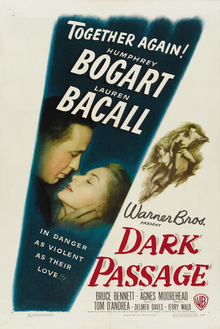
Dark Passage is a 1947 American film noir directed by Delmer Daves and starring Humphrey Bogart and Lauren Bacall. The film is based on the 1946 novel of the same title by David Goodis. It was the third of four films real-life couple Bacall and Bogart made together.
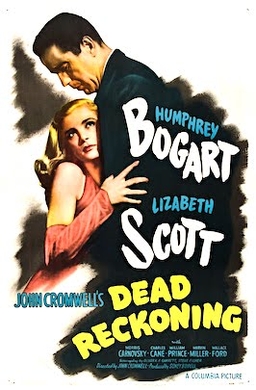
Dead Reckoning is a 1947 American film noir directed by John Cromwell and starring Humphrey Bogart, Lizabeth Scott, Morris Carnovsky, and William Prince. It was written by Steve Fisher and Oliver H.P. Garrett, based on a story by Gerald Drayson Adams and Sidney Biddell, adapted by Allen Rivkin. Its plot follows a war hero, Warren Murdock (Bogart) who begins investigating the death of his friend and fellow soldier, Johnny Drake (Prince). The investigation leads Murdock to his friend's mistress, a mysterious woman whose husband Drake was accused of murdering.
To Have and Have Not is a 1944 American romantic war adventure film directed by Howard Hawks, loosely based on Ernest Hemingway's 1937 novel of the same name. It stars Humphrey Bogart, Walter Brennan and Lauren Bacall; it also features Dolores Moran, Hoagy Carmichael, Sheldon Leonard, Dan Seymour, and Marcel Dalio. The plot, centered on the romance between a freelancing fisherman in Martinique and a beautiful American drifter, is complicated by the growing French resistance in Vichy France.
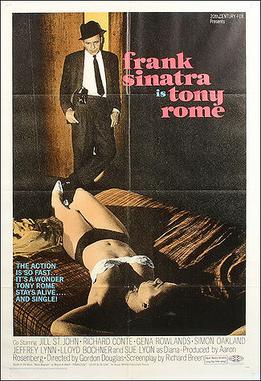
Tony Rome is a 1967 American neo-noir mystery crime thriller film directed by Gordon Douglas and starring Frank Sinatra in the title role, alongside Jill St. John, Sue Lyon and Gena Rowlands. It was adapted from Marvin H. Albert's novel Miami Mayhem.

Marlowe is a 1969 American neo-noir film starring James Garner as Raymond Chandler's private detective Philip Marlowe. Directed by Paul Bogart, the film was written by Stirling Silliphant based on Chandler's 1949 novel The Little Sister.
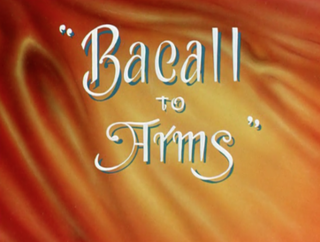
Bacall to Arms is a 1946 Warner Bros. Merrie Melodies series short planned by Bob Clampett and finished by Arthur Davis, in his second-to-last cartoon at Warner Bros. The short was released on August 3, 1946.

Thriller film, also known as suspense film or suspense thriller, is a broad film genre that evokes excitement and suspense in the audience. The suspense element found in most film's plots is particularly exploited by the filmmaker in this genre. Tension is created by delaying what the audience sees as inevitable and is built through situations that are menacing or where escape seems impossible.

Giri/Haji is a British crime drama television series which premiered on BBC Two in the United Kingdom on 17 October 2019, and was released internationally on Netflix on 10 January 2020. A co-production between the BBC and Netflix, the series was created and written by Joe Barton, and features an international ensemble cast including Takehiro Hira, Kelly Macdonald, Yōsuke Kubozuka, Will Sharpe, Masahiro Motoki, Justin Long, Anna Sawai, and Charlie Creed-Miles. The series is set in London and Tokyo, with dialogue in English and Japanese. In September 2020, it was cancelled by BBC Two and Netflix.
















